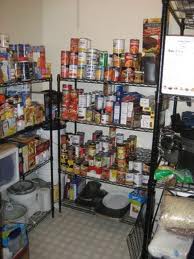 I hesitated writing this because I wanted it to be comprehensive, but I don’t want it to be a book. However, I am going to let it be as long as it needs to be at this point. Yesterday, I was out at my NJ Preparedness Meetup and one of the people asked me how I kept so much gear and food in my apartment. I will get into a little of that today, my trials, tribulations, my theory of food storage, and replacement, as well as security, guns (maybe), renting and more.
I hesitated writing this because I wanted it to be comprehensive, but I don’t want it to be a book. However, I am going to let it be as long as it needs to be at this point. Yesterday, I was out at my NJ Preparedness Meetup and one of the people asked me how I kept so much gear and food in my apartment. I will get into a little of that today, my trials, tribulations, my theory of food storage, and replacement, as well as security, guns (maybe), renting and more.
Well, here is…
Renting and financial preparedness.
The first thing you need to understand, is that when you are renting someone else’s property, you are not going to pay it off, and there is no end in sight for your shelter being yours, so that monthly payment you are making is in perpetuity. Rather, it is on going forever, which means there needs to be a reserve of cash that you have access to so that if you lose a job and have to re-establish employment that you have several months of rent and bills ready to be prepaid without sacrificing yourself to the streets.
Things to take into consideration when looking to save for an emergency are the following:
- Rent
- Rental insurance
- Car payment
- Car insurance
- Phone bill
- Cable / Internet bill
- Gasoline for your vehicle / vehicle maintenance
- Electric bill
- Gas / propane bill
- Cell phone bill
- Food
- etc…
 What I am saying is, is that if you are paying out $1,000.00 a month for rent, you may actually have to put out another $1,000.00 in bills for a total of $2,000.00 a month. People generally only look at their largest monthly expenses and the smaller ones slip their minds, like cell phone bill, etc. That said, as renters, I am going to go out on a limb and say that we should have no less than 90 days worth of expense money in the bank that we should forget about until an emergency. Ideally, as renters, we should have six months to one year of finances in the bank. In this economy, if you can put six months to a year in the bank and keep it there, fantastic. If you cannot, even one month’s worth of bills is a cushion that would be a start… My recommendation would be to have a goal to get one months worth of bills saved in a new savings account, then create a new goal to get two additional months into that account. I know it can sound like a tall order, but if you can get just one month saved, you have proven to yourself you can get three months saved. Psychologically, you will also feel better knowing there is at least a small pad there for you. Before my financial situation started to deteriorate in 2008 for reasons I will not get into here, I had a minimum of six months of savings in one savings account that never got touched, just for an emergency situation.
What I am saying is, is that if you are paying out $1,000.00 a month for rent, you may actually have to put out another $1,000.00 in bills for a total of $2,000.00 a month. People generally only look at their largest monthly expenses and the smaller ones slip their minds, like cell phone bill, etc. That said, as renters, I am going to go out on a limb and say that we should have no less than 90 days worth of expense money in the bank that we should forget about until an emergency. Ideally, as renters, we should have six months to one year of finances in the bank. In this economy, if you can put six months to a year in the bank and keep it there, fantastic. If you cannot, even one month’s worth of bills is a cushion that would be a start… My recommendation would be to have a goal to get one months worth of bills saved in a new savings account, then create a new goal to get two additional months into that account. I know it can sound like a tall order, but if you can get just one month saved, you have proven to yourself you can get three months saved. Psychologically, you will also feel better knowing there is at least a small pad there for you. Before my financial situation started to deteriorate in 2008 for reasons I will not get into here, I had a minimum of six months of savings in one savings account that never got touched, just for an emergency situation.
This is much harder than it looks, since we all like to spend for those things we want, but from prior experience, I can tell you the end result is worth it.
Storage or storing your stuff in an apartment
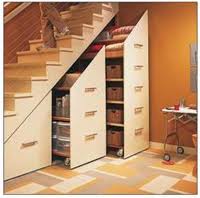 Living in an apartment clearly does not give you the sustainable space for gear and other storage that a house has, depending of course on the size of the house. Space is limited, and sometimes I feel like I am a hoarder or a junk dealer until I cannot stand everything in the way anymore. Then I go on a tirade of re-arranging and re-evaluating where everything is hiding and finding a better way to store things.
Living in an apartment clearly does not give you the sustainable space for gear and other storage that a house has, depending of course on the size of the house. Space is limited, and sometimes I feel like I am a hoarder or a junk dealer until I cannot stand everything in the way anymore. Then I go on a tirade of re-arranging and re-evaluating where everything is hiding and finding a better way to store things.
When you rent an apartment you cannot modify it as you would your own home. You are held hostage to the space you live in. There, generally speaking, is little or no way to add additional storage capacity to the living space, such as an additional room that can be built, a shed, etc. If you are looking for apartments, you may want to consider looking for something like where I live which is an apartment in a home, not an apartment building. Unless that apartment building offers additional basement storage where you can keep your other seasonal stuff out of the way and locked up. Just make sure it is ample storage space.
I specifically chose this apartment for a large deck on the rear of the house off of the home, as well as the shed on the property, which I have not taken advantage of because of nosy landlords downstairs, and a not so neighborly element there may be wandering around. In fact, the apartment building directly behind the home/apartment I am in, was condemned by the township at one point and there were two homeless people squatting there. I did not want my gear or food storage that I left in the shed to suddenly disappear one day like the Get Home Bag did our of my truck recently.
Here are a few ideas on how to store your gear and other items in your apartment. Some of this will be expanded on later in this post:
- Use vertical storage, such as shelves or portable cabinetry you can buy and take with you when you move to help stay organized and keep your stuff out of sight.
- Shop for furniture that gives additional storage space, as mentioned above and below such as:
- Under bed storage
- Coffee table storage
- Bench storage
- Shelving in a spare bedroom
- Small dresser inside of a closet
- Get creative and use creative use of space by modifying areas and “stuff” you do have, such as a table you may be able to drape a full length table cloth over to store stuff underneath it. I heard this somewhere, but forget where…
Security for your apartment
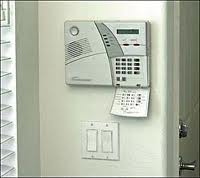 What are the reasons for Apartment Security? I mean you live in an apartment, right? With other people around, right? Well, let me outline a few things here. First, personal security in an apartment is pretty important. I say this because, there are a lot of people around. Personal security, to me comes in two forms; property and physical. Let’s examine both for a minute.
What are the reasons for Apartment Security? I mean you live in an apartment, right? With other people around, right? Well, let me outline a few things here. First, personal security in an apartment is pretty important. I say this because, there are a lot of people around. Personal security, to me comes in two forms; property and physical. Let’s examine both for a minute.
- For your property: If someone comes to your apartment, and they see what kind of stuff you have, and want it, they may be back for it if they do not see that it is secured in some way, then they may come back for it when you are not around. When people in your neighborhood see you come and go, they may get to know your schedule, and when you are not home, your stuff is vulnerable. Homes and apartments with security systems displaying the window stickers that the home is alarmed are three times less likely to be broken into than those that do not have them. That is a real life statistic.
- For your life: If your apartment is secured, the likelihood of a home invasion also goes down dramatically.
If you are allowed, get and install a monitored wireless alarm system for your apartment. If you are allowed to have a monitored alarm system, you may have to provide the landlord with a code for access to your apartment. The alarm system may not have to have heat or fire detection, as you already should have that in the apartment you are living. Depending on the township, city, or county building code, you may have to have them in the home/apartment not unlike where I live. There are three apartments in this home, and because there are three, the building code requires hard wired smoke detectors throughout the building.
If you live on the first floor of an apartment building or home with an apartment in it, I particularly recommend a monitored home security system, because your apartment is that much more accessible than a second or third floor apartment.
I will not get into brands of wireless alarm systems here. I do have experience with some of them bug a Google search or search on Amazon.com will give you a good education as to what is out there and what they cost. I will insist that you get one with a key fob, so that you can arm, disarm, and hit a panic button remotely to alarm police that there is an issue if you ever need to. Your monitoring service should also cost between 20 and 30 dollars monthly. Most alarm companies try to lock you into an agreement for 36 months and will move your alarm system for free if you ever move. Make sure you get that in writing.
Backup power in the apartment
 It is a little harder to prep for power outages when you live in an apartment because you are on the buildings electrical system. If the building or the localized grid goes down for any reason you are SOL when it comes to power. For many, unless they have a deck or s small balcony on their apartment (unless they live on the first floor) it is going to be harder to have power backup. My suggestion is a solar panel and a deep cycle battery or two and a power inverter, but make sure that your deep cycle battery is one that you can keep indoors without leakage of harmful fumes.
It is a little harder to prep for power outages when you live in an apartment because you are on the buildings electrical system. If the building or the localized grid goes down for any reason you are SOL when it comes to power. For many, unless they have a deck or s small balcony on their apartment (unless they live on the first floor) it is going to be harder to have power backup. My suggestion is a solar panel and a deep cycle battery or two and a power inverter, but make sure that your deep cycle battery is one that you can keep indoors without leakage of harmful fumes.
The second option for a power backup unit is a small generator that can be put on the deck or small balcony, and you can then run a cord inside to power several items such as a radio, a few lights, etc. The downside to a generator is that they make noise your neighbors can hear. If you are on the first floor of your building, this adds a whole new security risk to the equation from would be looters if the outage is wide, and the noise of the generator attracts attention. Admittedly, backup power is somewhat of a concern to me, especially in the winter, and is something I have done little about. Primarily due to the financial side. If I had my way, I would have a small generator, two deep cycle batteries, and a solar panel. The upside is that you can take them wherever you move, and they will always have some application for you.
Another power backup option to think about is a Power Dome EX. The Power Dome EX is a deep cycle battery unit that has a 400 watt unit made to jump start your car, but also has the ability, and capacity to run lights, radio, etc. for several hours. It was reviewed by Jack Spirko of The SurvivalPodcast.com on his YouTube Channel. You can watch the video here: http://bit.ly/b8gZxu. It may be worth the $100.00 price tag to have it charged and sitting around the bottom of a closet in your apartment until you need it. If you go on a long road trip, just throw it in your car, and take it out when you return home…
Also if you have an electric stove, make sure you get yourself a couple of burners or camp stoves that run on the on pound propane tanks so that you can cook if the power is out. They are pretty inexpensive if you buy something like this: http://amzn.to/aJG9m4 or this http://amzn.to/cV53aJ
Backup Heat for Your Apartment
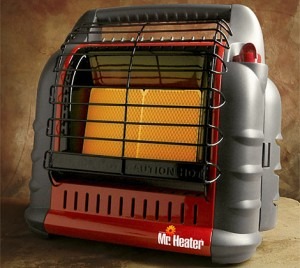 Realistically this is a tough call, assuming you live somewhere in the northern hemisphere where it gets very cold in the winter. This is a concern to me, because, frankly, I hate the cold weather. So, in the event there is a power outage, and / or the heat goes out, I purchased a Mr. Heater. Here is another video giving a quick overview of the Mr. Buddy: http://bit.ly/d1V46V. The version I have uses two one pound propane canisters. One thing you should also concern yourself with is whether or not you can have propane in your apartment. I am not, but I have them anyway, for a portable Weber grill on my deck, and they also work with my Mr. Buddy. I know I can close off one room in my apartment if I had to, and run the Mr. Buddy to keep warm for several days with the number of propane canisters I have. If I need to crack a window I can do that as well… Other ancillary items that I have to help keep warm are a few hurricane lanterns and lamp oil. The lanterns get VERY hot to the touch, but you will want to make sure you have a window cracked or two, as they do not burn so cleanly… They are a last resort, but I have them anyway because they were inexpensive.
Realistically this is a tough call, assuming you live somewhere in the northern hemisphere where it gets very cold in the winter. This is a concern to me, because, frankly, I hate the cold weather. So, in the event there is a power outage, and / or the heat goes out, I purchased a Mr. Heater. Here is another video giving a quick overview of the Mr. Buddy: http://bit.ly/d1V46V. The version I have uses two one pound propane canisters. One thing you should also concern yourself with is whether or not you can have propane in your apartment. I am not, but I have them anyway, for a portable Weber grill on my deck, and they also work with my Mr. Buddy. I know I can close off one room in my apartment if I had to, and run the Mr. Buddy to keep warm for several days with the number of propane canisters I have. If I need to crack a window I can do that as well… Other ancillary items that I have to help keep warm are a few hurricane lanterns and lamp oil. The lanterns get VERY hot to the touch, but you will want to make sure you have a window cracked or two, as they do not burn so cleanly… They are a last resort, but I have them anyway because they were inexpensive.
Water Storage, this is always a question I get
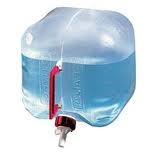 For Water Storage I have six five gallon collapsible water containers that sit at the bottom of a closet giving me 30 gallons of water storage. Each five gallons of water you store, add 1/2 a teaspoon of unscented bleach, and this should keep the water potable for one year. I keep the water in five gallon containers because it rations, compartmentalizes, and makes the water more portable if I need to throw a couple of containers in the back of my truck for camping or to bug out.
For Water Storage I have six five gallon collapsible water containers that sit at the bottom of a closet giving me 30 gallons of water storage. Each five gallons of water you store, add 1/2 a teaspoon of unscented bleach, and this should keep the water potable for one year. I keep the water in five gallon containers because it rations, compartmentalizes, and makes the water more portable if I need to throw a couple of containers in the back of my truck for camping or to bug out.
I have also added a Waterbob to my emergency water storage plan. This is nifty product that sits in your tub and you fill it up with 100 gallons of water in the time of an emergency so that you can use it for hygienic and consumption purposes. You can go directly to the Waterbob Website and learn more as well: www.waterbob.com. I would not hesitate to put this in my truck, and use a garden hose to fill it half way or so if I were bugging out either. It is made to hold a lot of water, and you may only need 50 gallons or so to get to your destination. If bugging in, well, you should have some ample water, even if you had to give five gallons of water away to a neighbor if you wanted to be nice…
Food Storage
 For food storage you have to be sure to make better use of your space. Making sure you use your space efficiently if very important so that you can store the maximum amount of food in the smallest amount of space. I have found this very difficult to do. To try to use my space more efficiently, I added a shelving unit to my home office/additional bedroom that stands about 6 — 7 feet high. I use it for some office supplies, but primarily for food storage of five gallon buckets and canned food. If you do not have a second bedroom, I might look into an inexpensive unit from IKEA like this one: http://bit.ly/ajPZv7. I like it because it is relatively inexpensive, and has a frosted glass door look so that anything you stack in it remains hidden from all your nosy friends who would come over and ask you why you have a stack of food laying around that you are not eating or is in bulk… You may also be able to find one on Craigslist for sale under their furniture section for much less than the 99.00 price tag.
For food storage you have to be sure to make better use of your space. Making sure you use your space efficiently if very important so that you can store the maximum amount of food in the smallest amount of space. I have found this very difficult to do. To try to use my space more efficiently, I added a shelving unit to my home office/additional bedroom that stands about 6 — 7 feet high. I use it for some office supplies, but primarily for food storage of five gallon buckets and canned food. If you do not have a second bedroom, I might look into an inexpensive unit from IKEA like this one: http://bit.ly/ajPZv7. I like it because it is relatively inexpensive, and has a frosted glass door look so that anything you stack in it remains hidden from all your nosy friends who would come over and ask you why you have a stack of food laying around that you are not eating or is in bulk… You may also be able to find one on Craigslist for sale under their furniture section for much less than the 99.00 price tag.
You can also take a look at Shelf Reliance products, although, in an apartment, they may not make sense unless you get the units made for inside your cabinets.
Another way to store food, if you do not mind traveling to get it, is in a storage unit. I am not particularly fond of this idea, because the temperature may vary in storage facilities, shortening the life of your food. Also, should you fall in hard financial times, and fall in the rears on your rental payment to the storage facility, they could claim all your food as collateral or auction then you are the money you paid for the food, as well as the food. I only bring this up, because many people are living paycheck to paycheck in this rough economic climate.
If you are luck enough to have storage space in the basement of your apartment building, please make sure that anything you store down there is sealed well several times, and at least in mylar, inside of some sort of plastic bins or metal containers to keep the creepy crawly vermin out of it. You will also want to camouflage anything that is not in plastic or metal containers so that the others in your building do not see you storing food and supplies in the basement of your apartment building. That would be a big no-no since it is a semi public area , and you do not want to have it stolen if there is an emergency situation at some point and you are sheltering in. This is the real downside of apartments and apartment buildings. No matter how secure they may be, you are still in the semi public eye due to all the other inhabitants of the building.
An option you may also might be a friend’s or family member’s home close by that wouldn’t mind you using a corner of their basement. Assuming of course they are of the same mind set. I suppose you wouldn’t have to tell them what is in your plastic bins, etc., but I would gather everyone might peek to see what’s inside.
If you are just starting out, take a trip to the grocery store with your pen and pad, write down everything you buy, and everything you want to buy for storage, along with the prices. Come home, and evaluate the core foods you would need to buy for sustenance. i.e. rice, legumes, soups, etc. Then set aside 15.00 — 20.00 dollars a week for your food storage. You would be surprised how quickly you can get that storage to add up.
Also research how to store it properly. It’s not expensive to store the food, but it does have to be done correctly. There is a lot out there on that, just Google it. Oh, and don’t worry about the long term storage right away with O2 absorbers and all that, just get the ball rolling. You will fall into everything else as you learn…
Cash, Gold, Silver, Barter
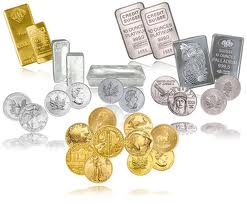 First, as far as cash goes, I mentioned at the very beginning of this post that you should have cash for an extended period of time in the event that you require it. I am not going to rehash that here. But I do want to touch on spendable or barter-able currency.
First, as far as cash goes, I mentioned at the very beginning of this post that you should have cash for an extended period of time in the event that you require it. I am not going to rehash that here. But I do want to touch on spendable or barter-able currency.
It is my theory that in suburban and urban situations, those with cash are going to try to capitalize on it’s use to buy themselves out of trouble when the SHTF. I think that your neighbors will use any cash they have on hand to buy goods from other neighbors because they will still see the cash as having value in their minds, so they will continue to use it until they have exhausted their supply and start trying to trade or barter with whatever they have. This is when the looting will start. In fact the looting will start by those that do not have the cash they need to buy their “just in time supplies” of food, water, shelter, etc. It is my contention that most urban and suburban families or people in financial crisis only have a few days worth of food and water on hand at any given time. I may be wrong, but I remember a several years ago when I first moved to the NYC area and had a hard time getting a job, the roof over my head got paid first, the heat and electric bill second, and third was reserved for food. I only had a few days worth of food at any given time.
Another consideration recently has been junk silver and gold. Honestly, I am not sure how or what I would barter for gold or silver if the situation presented itself. It is so expensive today for both, that those who own it have a higher perceived value than I do. If there is no way to measure it’s worth then it is worthless, unless you really need my 1lb bag of rice that badly. Then it’s worth the gold piece, in which case, I will two and get two, three, or five gold coins from you for that bag of rice. I have been thinking more about barter recently, and will be discussing it more in the future as I ponder more about it, and the value it creates for those who have and for those in need… My theory stands, however, that people will try to use cash because of the perceived value of the paper vs. any other method of trade because it is all they know at the moment. The last time most adults practiced barter and negotiation was as a kid with their friends for that cool toy their friend had…
On the other hand, if you have skills in auto repair, plumbing, etc, you may be able to barter your skills for services, gear, or some of that gold and silver.
On Growing a Small Garden
 I think this is a good idea if you can. First, if you have the space on your deck, terrace, or balcony, do it. Not primarily because it will save you a ton of money, because your space will be limited, and you will not get the high yield of vegetables you would need to can or jar so much that you do not have to go shopping for produce all year. I say do it so that you learn how to nurture plants to grow and produce those foods that you would need in a SHTF if you did have to evacuate and bug out. Do it so that you can taste the difference between the corporate steroid produced vegetables you get at your grocer vs. something more organic that you grew yourself. learn to understand the nuances of the plants you are growing like spinach, tomatoes, corn, etc. I have done this on my deck, although I have not over the past two years because of business travel. Had I gone away, and they were not watered on a hot week, the garden would have been for nothing as the plants would have died, since I can sometimes be gone five — eight days at a time. Otherwise, I would take advantage of the local farmers market, as I mentioned in my post “The Advantages of the Suburban Farmers Market, and learn how to dehydrate and can those vegetables for the future. If that is too much work for you, I recommend looking to someone like Harmony House for your dehydrated fruits and vegetables as well as other dehydrated foods.
I think this is a good idea if you can. First, if you have the space on your deck, terrace, or balcony, do it. Not primarily because it will save you a ton of money, because your space will be limited, and you will not get the high yield of vegetables you would need to can or jar so much that you do not have to go shopping for produce all year. I say do it so that you learn how to nurture plants to grow and produce those foods that you would need in a SHTF if you did have to evacuate and bug out. Do it so that you can taste the difference between the corporate steroid produced vegetables you get at your grocer vs. something more organic that you grew yourself. learn to understand the nuances of the plants you are growing like spinach, tomatoes, corn, etc. I have done this on my deck, although I have not over the past two years because of business travel. Had I gone away, and they were not watered on a hot week, the garden would have been for nothing as the plants would have died, since I can sometimes be gone five — eight days at a time. Otherwise, I would take advantage of the local farmers market, as I mentioned in my post “The Advantages of the Suburban Farmers Market, and learn how to dehydrate and can those vegetables for the future. If that is too much work for you, I recommend looking to someone like Harmony House for your dehydrated fruits and vegetables as well as other dehydrated foods.
A Preparedness Library
I think this one goes without saying. First, everyone needs a couple textbooks on survival that they need to be bugging in or bugging out with. I will not get into what to have, but I do think you need both a physical library, as well as an electronic library. Your physical library can be taken with you, but the electronic version you can make much more portable, as well as use as a barter tool to give to others to use on their portable PCs. I recommend making copies of your electronic library on CDs so that you can give them aways.
If you have not seen my electronic survival library, you can take a look at it by clicking this link: http://bit.ly/cfL8WY
Your Bug Out Bag
 This is going to be a short paragraph. If you want to see what is in mine, you can click on this link to see it. But it is shortly going to get scaled down, and will post when I do it. What I will say is plan appropriately. Do not over buy, and do not under buy. While I was learning earlier into my prepping lifestyle I over bought bug out packs, and gear. I have wasted a lot of money, and even had a pack stolen recently that set me back with some gear. Today I still have two backpacks, one of which just takes up space. I would look to books like Dave Canterbury’s “Survivability for the Common Man” or “Build the Perfect Survival Kit,” by John McCann to give you a better idea what you need based on your existing skills. Both books are about the same size and easy reads with excellent information about building your kit…
This is going to be a short paragraph. If you want to see what is in mine, you can click on this link to see it. But it is shortly going to get scaled down, and will post when I do it. What I will say is plan appropriately. Do not over buy, and do not under buy. While I was learning earlier into my prepping lifestyle I over bought bug out packs, and gear. I have wasted a lot of money, and even had a pack stolen recently that set me back with some gear. Today I still have two backpacks, one of which just takes up space. I would look to books like Dave Canterbury’s “Survivability for the Common Man” or “Build the Perfect Survival Kit,” by John McCann to give you a better idea what you need based on your existing skills. Both books are about the same size and easy reads with excellent information about building your kit…
Building your BoB is personal. It will contain personal items based on your experience and your skill levels. The more you know, the less you will need in your Bug Out Bag.
I keep mine in the closet and out of site. Not that I care if anyone sees it, but I just do not want to keep having to justify myself to others, if that makes sense. It also tells people there is something you may have that they want in a possible emergency situation.
On Guns, Knives, and Ammunition
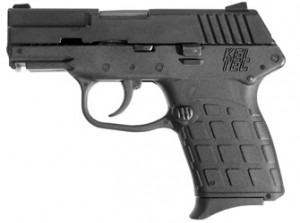 This is a hot topic for many. I am not going to go into much detail here, as there are so many resources on the Internet about guns, ammo, knives, etc. that you should do your own research, and judge for yourself.
This is a hot topic for many. I am not going to go into much detail here, as there are so many resources on the Internet about guns, ammo, knives, etc. that you should do your own research, and judge for yourself.
As for guns, whether you ever own one or not, you should take a safety course, learn how to handle and not handle them, as well as know the importance of their dangers in the wrong hands. I am a second amendment advocate, and have the luxury of owning several for sport and for self defense.
What I will say here, is that if you own several, or plan on owning several these may be the most valuable barter items you could ever own. Especially if you have the money to own a few. Guns suggest power, and power suggests control for many, especially those that would do you harm for your gear or other items. I would say that if you barter with ammunition, knives or guns, be sure you are bartering with an ally and not a would be looter. In fact, if you have banded together with a group of individuals that you trust, I would not barter them outside the group, ever.
In a perfect world, I would own two of every gun I enjoy shooting and am proficient with. That would be for a cache of spare parts in the event I needed them. Of course you need to know what you are doing when you take one apart.
As for knives, buy several, use them in the field. Learn your limitations and theirs. I have several, and they each have a utility of sorts. Some are best for slicing and cutting, some better for battoning (not sure if I spelled that correctly), filleting, spearing, chopping, etc. Become proficient with your knife/knives, learn some wilderness skills, and you may never need anything else when you go camping, hiking, are lost, or during a SHTF.
Finally, if you do make the choice to invest in any guns while living in an apartment building or complex, please make the choice to buy a gun safe as well, and keep them locked up away from those who might want to take them from you when you are not around, or worse. Put it in the back of a closet, and don’t tell anyone you have it.
Finally
All of this is an expensive venture. It will not appear overnight that is for sure. It takes time. It took me six months to get just a few months of food storage built up. It will take me another six months to get another few months of food storage built up. The issue is, where to I store it?
Thanks for reading this rant today. I could have written a LOT more. I wanted to write a lot more, but I have been at this since 9:30 this morning and it is now2:30 on Sunday afternoon. I hope you enjoyed…
Please feel free to comment, and all you more experience guys, feel free to add to this in the comments as well.
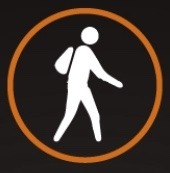
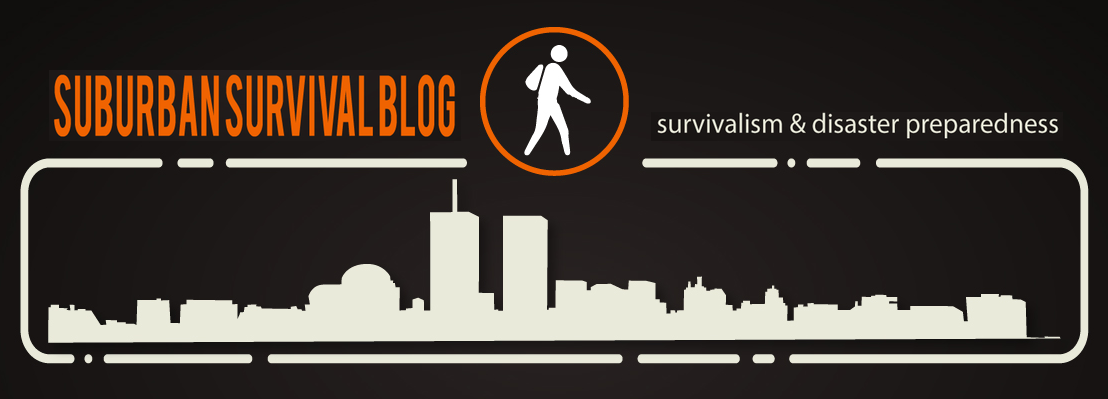


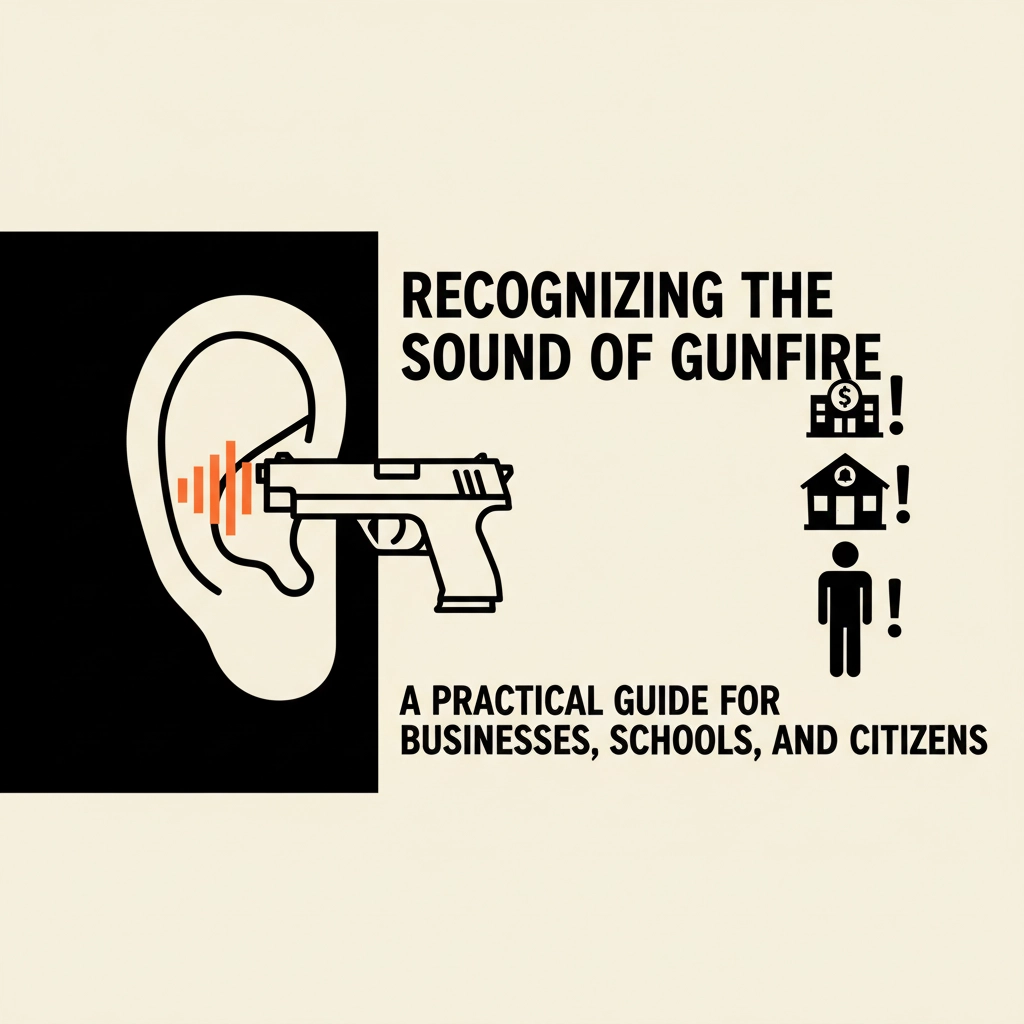
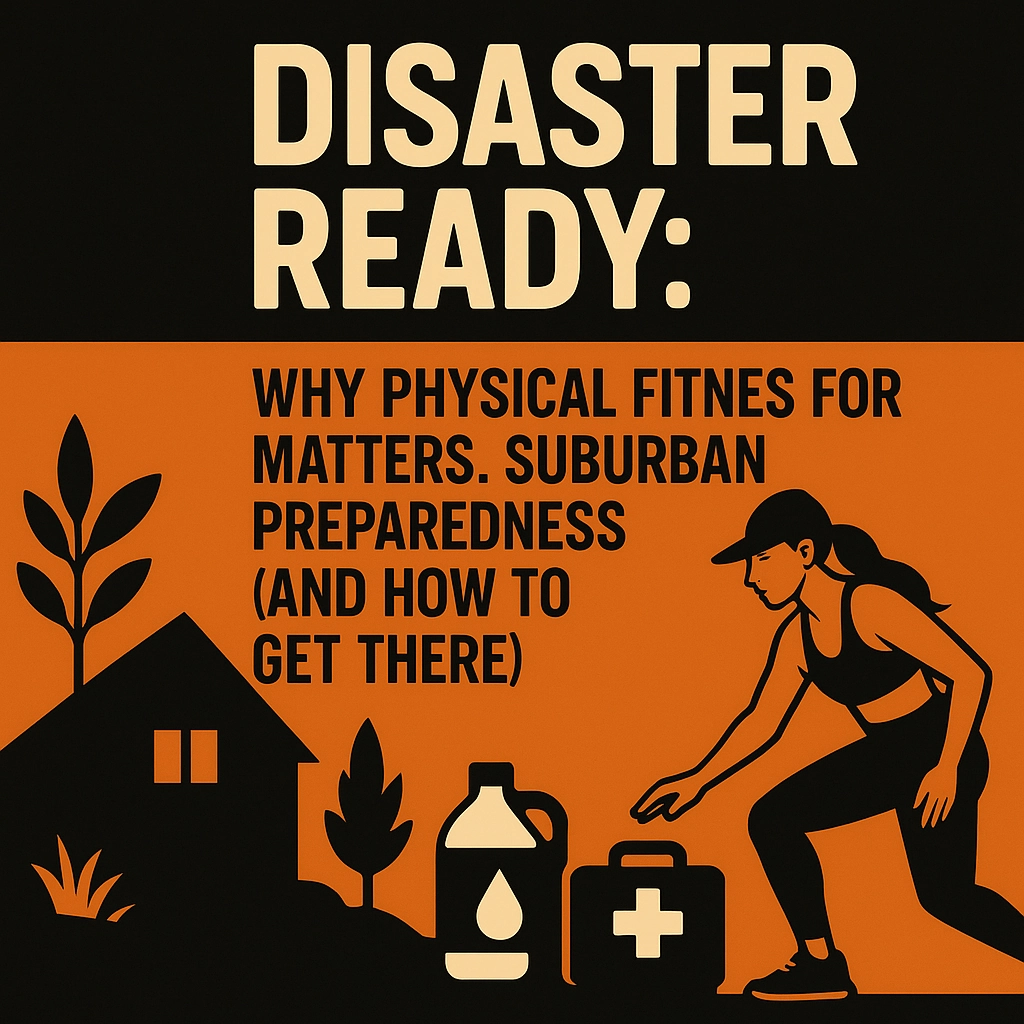



Great comprehensive article on the various concerns on preparing while living in an apartment. We had been considering whether to get some kind of generator, but have not done so, as most generators are too noisy for an apartment. So we thought, solar may be the way to go so we looked into mysolarbackup.com. Sounded good BUT the cost is too prohibitive, and we’d have to position it in the front balcony which would cause undue attention. Would not want to advertise “I got solar power!” when everyone else is sweltering in the dark. I will check out Power Dome EX described in your post; would be interested if you do purchase it how it turns out.
You need to also take into consideration storing gasoline for the generator. Living in an apartment makes this harder due to fire code regulations. I technically cannot have propane tanks, gasoline, or anything combustible that can cause mass damage to the building on my deck or in the apartment due to the fire code here in northern NJ. I have thought several times about violating that. However, I do have access to a shed, outside on the property, and I may buy one of those 14 gallon gas can/pumps (http://amzn.to/gyWwo4 ) to keep full in the shed. 14 gallons will just about fill my gas tank from empty, and double my travel capacity if need be. Not to mention run a small generator for days/weeks if need be. I would not hesitate to run one in the winter. Most people will be sheltering inside, and if it is small enough for a few essentials, then I think I could get by with it… Just thinking out loud here…
Oh, and I will let you know about the Dome product, but you should watch the video…
Keep in mind you’ll need stabalizer and even then it’s debatable how long gas can be stored. I’ve read anywhere from 6 months to 2 years. Muchless if you use E85. Don’t know about desiel.
Yup, I was planning on Sta-Bil and rotating it out about once a month or once every 60 days in my truck to keep it fresh as possible…
I’ve also heard PRI gas treatment is very good but don’t have any first had experience with it.
I agree, with both you and Master Po’s reply. I think power would have to remain low key if sheltering in. This is the gray area where you have to decide whether sheltering in and bugging out are advantageous to you. I know people here in NJ that are adamant about bugging in because they have kids that are too small or elderly family living with them.
I will let you know about the Power Dome EX. Not sure I am going to buy it, but I like it. If I buy it, it may be in conjunction with the solar panel and a couple of deep cycle batteries so that I have a complete, renewable, semi portable system that can be used in the home, mounted to my truck, or set up in the field for use. It is probably a 500 — 600 dollar investment for everything I want in the electricity generation area… But I urge you to watch the video from Jack at The Survival Podcast…
Good article.
For the gold/silver barter, you mention “junk” gold and silver. I presume you mean chains and the alike. Interesting thought though I think anyone willing to take gold/silver in exchange for food-water-etc will want proof it’s legit (I would) so jewlery is questionable. Coins or ingots seem better though obviously more expensive. Frankly I have no idea how exchange of gold for say food might work. Let’s hope we never have to find out.
As for bartering other items, I would never barter away any sort of weapon like a gun or knife, or weapon supply like ammo or magazines or cleaning products. Even to people you know. Somethings stay. Just seems too risky.
Many years ago I saw a ’60 Minutes’ story about survivalists. They interviewed one guy and asked him about trading. They scenario was someone comes to him with a case of food wanting to trade it for a gun. The guy refused to give details but said at the end of it all he would have the food and still keep his guns. You can fill in the blanks… That left an impression on me.
I like the idea of skills bartering though. That’s presuming you have needed skills however.
As far as emergency electricity in a SHTF or worse event, while important I think of equal importance is to keep a VERY low profile about it. If the whole neighborhood is w/o power and your house or apt is lit up like a normal day that’s going to attract far too much attention. Even the sound of a generator can bring people you don’t want. Solar and wind power is easy to spot from a distance.
I also forgot about “alcohol bartering…” It seems to me that alcohol would become MUCH more valuable than any kind of gold or silver. As for the gold and silver, juk silver is defined as 1964 or pre-1964 nickels, dimes, quarters, etc. because they were still made with silver and have much higher contents of silver than todays coin, and are worth much more than you would expect. I may do a post on this. However, I think in a real SHTF, people will still use their paper money for barter before they use gold or silver. You can also buy real gold coins or silver coins at 1oz. each. However, I am of the mindset that this will only be worth something to someone who sees value in it, and I think people will continue to see false value in paper money and goods such as food, skills, and alcohol. Until there is some governmental or village currency that is re-established gold and silver mean nothing. I may be wrong here, but I think I am right.
IMO “junk” silver as you describe it — along with 90% coins — aren’t worth it for barter. Few people know what they are. By contrast people well know what a silver or gold Eagle, Maple Leaf, Credit Suisse wafer etc is.
Speaking of barter items, don’t over look “family” items like baby food, diapers, bottles, women’s ‘products’, etc. Even if you don’t use them yourself imagine what a father would pay for a can of baby formula or a woman would do for a ream of diapers?
Good points Master Po!!!
I really enjoyed this post — as usual you’ve put a lot out there to think about. I live in a home and its a lot easier to do this stuff — yet I’m lacking in quite a few areas! (Need to look into a generator first I think.)
Just an idea — what about just getting some alarm stickers on e‑bay? You get the visual deterrent w/o the expense of an alarm if cost is a factor at the moment. (that’s what I do)
People do that all the time. The stickers are the deterrent, because the would be burglar does not know if there is an alarm system there or not. The same concept as the “armed citizen,” crime goes down… Make sure you get a name brand sticker when you do it or something that looks real.. Get a yard sign as well that you can put in your yard. I used to work in home security for a couple of years, and that is the tell tale deterrent.
As for an Alarm system, an alarm company will discount the cost of the installation to get your monitoring contract.
Thanks for the kind words. It took hours to sit down and write that post, and there is a lot I left out. I may break it down and add more content to the different sections as follow-up posts going forward.
I found your post very interesting. I have been searching for something like this, to find any ideas that I might have missed. Sadly,I did not, which is a good thing. For you have mentioned everything I have thought of to prepare while living in an apartment. I do have one advantage,and it was on purpuse when I found my apartment. It is on the second floor,and has a fireplace. This is great for just not cozzy romantic nights with the wife, but heating and possible even cooking.
Michael — that is great. Honestly wish I had a fireplace. I have thought several times about getting a portable wood stove just to keep in a closet for that purpose in the event that what you mention has happened. On another note, I’m glad I didn’t miss anything. Thanks for reading!
WRT water storage, keep in mind that household bleach degrades over time. According to this article, it degrades at a rate of about 20 percent per year.